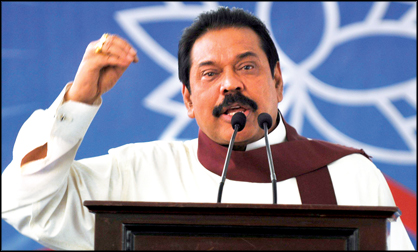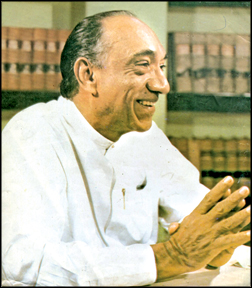|
Presidential Election:
Yesterday Today Tomorrow
S. S. Sahabandu PC
The Presidential Election 2010 seeks to give
a mandate for a second term for President Mahinda Rajapaksa. This
article looks at the issues before the electorate and other matters
connected with a Presidential poll
The UNP manifesto placed before the people in 1977 had a reference to
the creation of a President, by deviating from its usual ceremonial
role. There was no reference in the manifesto to proportional
representation though it was introduced without acquiring a mandate from
the people.
 |
|
President
Mahinda Rajapaksa. Picture by Sudath Silva |
One of the main issues placed before the people for the upcoming
election is the abolishing of the Executive Presidency. The main
architect of this concept of Executive Presidency, J. R. Jayewardene was
installed as President on February 4, 1978 for his term of office to end
on February 4, 1984. No Presidential election was held prior to February
4, 1978 for this purpose. The first Executive President was inaugurated
to office without a Presidential Election. For those who talk about
democracy, was this democratic?
A fresh mandate
Some pose the question as to why the President is asking for a
mandate before a period of six years. This provision was included and
amendment was made by the Third Amendment of President J. R. Jayewardene
to seek a fresh mandate after the expiration of four years. In fact, he
sought a fresh mandate after a lapse of four years.
The question of dissolution of Parliament and seeking a fresh mandate
for the Presidency is entirely a matter for the President as head of the
Executive. In fact, lawyers led by S. Nadesen, QC, opposed this
amendment but it was allowed by the Supreme Court. The political
authority has decided as at present, that as the war is over and the
President has fulfilled this part of the mandate, he should seek a fresh
mandate on the economic development of the country. So that, the
President is not doing anything wrong. He is only using the provisions
of the Constitution given to him by the UNP and President J. R.
Jayewardene.
How do you abolish the Executive Presidency under the present
Constitution? Amendments to the Constitution of a certain type, require
a two thirds majority of the whole number of Members of Parliament
(including those not present), and is approved by the people at a
referendum.
The Supreme Court has held, ‘in the Constitution all the articles
which should be amended only by a two thirds majority and by a
referendum, have been grouped together in Article 83 of the
Constitution’. One of the main features of the Presidency is it can only
be approved by this elaborate procedure.
Novel feature
All these matters, getting the required numbers of Members of
Parliament and approval at a referendum may take a long time, or may
never happen at all. To accomplish this task would be very difficult.
The novel feature of the Executive Presidency created by J. R.
Jayewardene was that it was introduced to help his party, the UNP. In
France it was introduced because governments did not have a sufficient
majority.
Here, it was introduced because there were violent swings in the
electorate in a Westminster style poll. J. R. Jayewardene knew that the
five sixth majority he received in 1977 could be destroyed at the next
election, so he devised a system for the UNP to remain in power for all
time. The first was the introduction of the Executive Presidency, and
the other was proportional representation with a 12.5 percent cut off
point, which President Premadasa reduced to five percent to help the
Muslim minority.
Other mechanism
The principles that J. R. Jayewardene worked out after studying the
election results carefully, were that the religious and ethnic
minorities are with the UNP. Tamils could be an exception. Even in 1956,
the UNP got about 29 percent in a national poll based on seats,
stretched for several days. The Executive President who is from the UNP
could get at least 35 percent of the Sinhala votes and with the
minorities he could be a comfortable winner. The other mechanism,
proportional representation would see that the UNP is not wiped out in
the legislature.
President Premadasa made proportional representation, proportional
misrepresentation by reducing the cut off point from 12.5 percent to
five percent.
UNP’s toppled plans
 |
|
J. R.
Jayewardene |
The electorate has not been kind to the UNP. The UNP won two
Parliamentary Elections in 1952 and 1977, and a Presidential election in
1982 with a clear majority. In Presidential elections it has lost all
except two. The election of President Premadasa was fatally flawed and
it was challenged in court for four years.
The election of President Premadasa was held on December 19, 1988.
There were three candidates. President Premadasa got 50.43 percent of
the votes. Mrs Bandaranaike got 44.95 percent of the votes.
Ossie Abeygunasekera got 4.63 percent of the votes. President
Premadasa won by a majority of 279,339 votes and he went into the poll
as Prime Minister. In an election that had plenty of JVP violence, of
the eligible voters only 55.32 percent polled, a very low poll in
election in this country. So far, a candidate from the Opposition has
never won a poll that is Presidential.
Always, the incumbent President or the Prime Minister has won. This
time also there would be no exception. Some point out the fact that
Churchill lost after winning the World War, but Churchill lost in the UK
in a Westminster style election. In Sri Lanka we have a Presidential
election with the following conditions prevailing in our country.
Executive Presidency
The UNP which claims that its fight for democracy and the abolition
of the Executive Presidency, is not because of any lofty motives, but it
cannot win a Presidential election. They created the Executive
Presidency which they now want to abolish. J. R. Jeyewardene and the UNP
started its journey to democracy in 1977 by giving the police a holiday
after the poll. Many houses of SLFP and Opposition supporters were
attacked. In recent times when the UNP came in for a short period the
same happened.
The UNP extended the term of Parliament by six years without
elections through a rigged referendum. The Fourth Amendment presented to
the Supreme Court under article 122 1 (b) was heard by seven judges - N.
D. N. Samarakoon, CJ, J. G. T. Weeraratne, S. Sharwananda, R. S.
Wanasundere, B. S. C. Ratwatte, D. Wimalaratne and J. R. Victor Perera.
Of them only one judge is alive today. The court stated, ‘the majority
of this court is of the view that the period of the first Parliament may
be extended as proposed by the draft bill, which is described in its
long title as being for the Amendment of the Constitution and is
intended to be passed with the special majority required by Article 83
and submitted to the people at a referendum.”
Three members of this court are not in agreement of the above view.
As to who the three members were and which remains unchallenged is
contained in a book titled, The arrogance of power, myths, decadence and
murder by Rajan Hoole on page 90. All this J. R. Jayewardene did by
talking of a Naxalite plot.
The referendum was held with all its infirmities and the term of
Parliament kept intact the five sixth majority that the UNP had in
Parliament. The Commissioner in its report states “the referendum held
on December 22, 1982 became the first national poll to be held under a
State of Emergency.” All this was brought in the name of democracy by
the UNP. Post-referendum Sri Lanka proved to be a disaster.
The JVP insurrection in which several youth were killed was one.
Tamil people decided to keep away from Parliament, and on July 22, 1983,
at the beginning of the second term, 13 soldiers were killed. The reply
the UNP and J. R. Jayewardene gave the Tamil people was the 1983 riots.
India got involved and the stage was set for Tamil youth insurrection
and the rise of Prabhakaran.
This insurrection took hold of the country for almost 25 years. It
was left to President Mahinda Rajapaksa to end it in May this year.
During this 25 years Indian troops came here. An internationally
recognized terror group, the LTTE was given territory in this country by
the Ceasefire agreement signed with the LTTE. The Tamil Diaspora and the
western powers helped the LTTE during this period.
Can a war be won by a military effort only? The answer is an obvious
No. The political authority is the most important in a war. President
Mahinda Rajapaksa gave the political leadership by handling foreign
powers, especially India. He gave the weapons to military and the money
to employ more soldiers.
It is his leadership that gave the military the confidence to
complete this task. Why did Prabhakaran fail? He was only concerned
about the military effort. He did not care about the political
consequences of his decisions.
The killing of Indian Prime Minster Rajiv Ghandhi was a huge
political blunder. He was a sun god, political and military leader
combined.
The 13th Amendment to the Constitution was introduced because of
Indian pressure. Can you pass the 13th Amendment without a two thirds
majority? The answer is, you cannot. Now, J. R. Jayewardene and the UNP
by keeping in tact the two thirds majority, through the referendum,
provided the majority to pass the 13th Amendment. J. R. Jayewardene
advocated proportional representation, but he never practised it.
The JVP, a party of the petty bourgeois has come out in its true
colours by supporting the UNP. It has made several wrong decisions.
The 1971 insurrection, the decision to support Lakshman Kadirgamar to
be Prime Minister, and the present decision to support Sarath Fonseka as
President backed by the UNP are a few of such.
President Mahinda Rajapaksa has 40 years of political experience and
has served as a Member of Parliament, Cabinet Minister, Prime Minister
and President.
His main opponent is only a military leader, depending on others to
give him a lesson in politics.
The poll will show that the people will prefer an experienced
politician to a mere military commander. Retired Generals should have a
look at General Douglas Macarthur’s adage “Old solders never die. They
just fade away.” |



